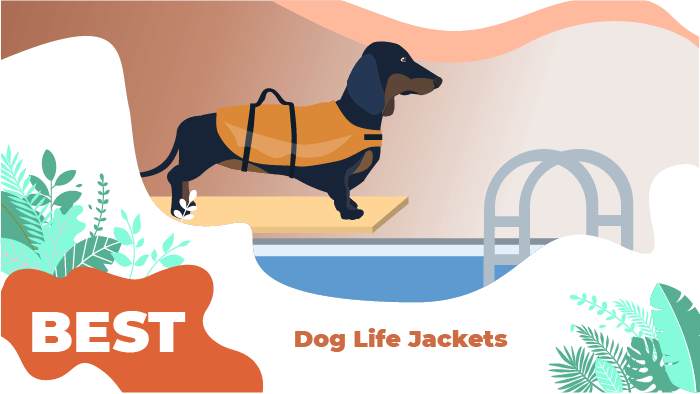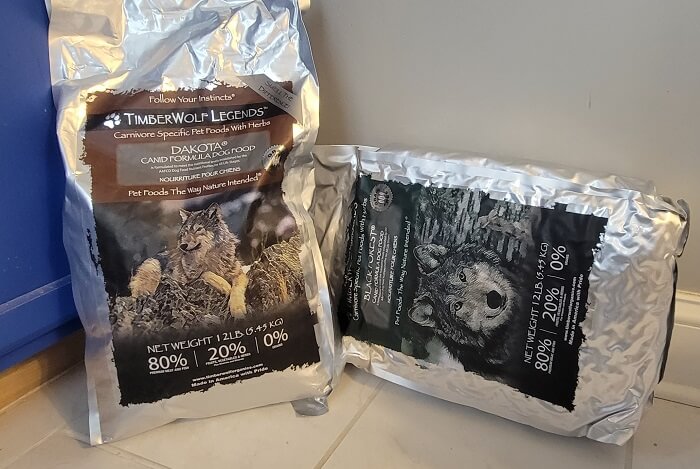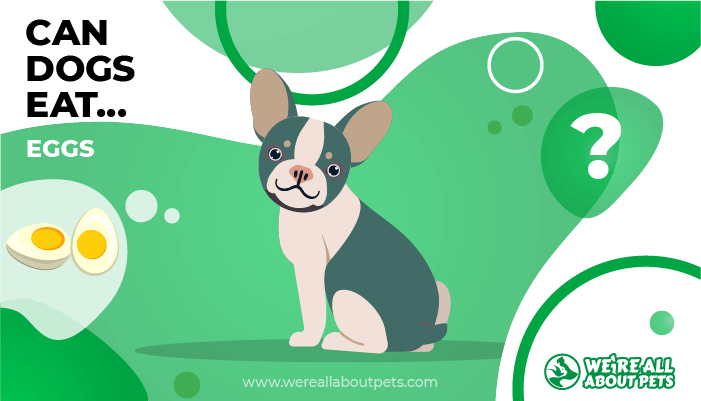Can Dogs Eat Oranges?
This page contains affiliate links. We may earn money or products from the companies mentioned in this post through our independently chosen links, which earn us a commission. Learn More
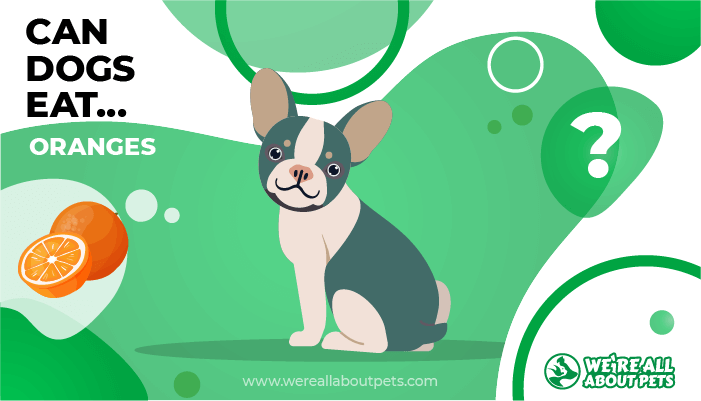
Many of us have a glass of orange juice to start the day. Oranges are also a healthy snack at other times. But what about dogs. Can dogs eat oranges?
You might be surprised to learn that the answer is yes, dogs can eat oranges, though not all dogs like them. As with other fruits and vegetables, though, there are some things you should know before you give your dog any orange slices.
To find out what parts of the orange you can – and cannot – give your dog, read our short guide.
Oranges Nutrition Stats
One cup of an orange, in sections (180 grams) is considered to be a serving size for a human.
- 84.6 calories
- 1.7 grams protein
- 0.2 grams fat
- 21.1 grams carbohydrates
- 4.3 grams dietary fiber (17% daily value)
- Vitamin A 405 IU (8% daily value)
- Vitamin C 95.8 mg (160% daily value)
- Thiamin 0.2 mg (10% daily value)
- Folate 54 mcg (14% daily value)
- Calcium 72 mg (7% daily value)
- Potassium 326 mg (9% daily value)
One medium orange has about 68 calories.
Orange Nutritional Facts At A Glance

The sweet oranges we enjoy today do not grow in the wild. Orange trees that produce sweet oranges are hybrids that have been grown in numerous varieties for more than 2000 years. There can be some slight nutritional differences in oranges, depending on the variety, but most of them are very similar.
Oranges are one of the best sources of vitamin C. They are also a good source of dietary fiber when the pulp is included. Oranges are also high in thiamin, folate, and potassium.
Oranges also contain a range of phytochemicals such as the carotenoids beta-carotene, lutein, and others. They have flavonoids, and volatile organic compounds that produce their pleasant orange scent.
Orange juice has less citric acid than lemon juice or lime juice but it still contains enough citric acid to irritate people who are sensitive to it. It can also discourage some dogs from eating oranges.
On the negative side for dogs, a large amount of the calories in oranges come from sugars such as sucrose, fructose, and glucose.
By percentage, oranges contain 91 percent carbohydrates, 2 percent fats, and 7 percent protein.
Can Dogs Eat Oranges?
Yes, dogs can eat the flesh of the orange. They should not eat the orange peel or the pith. It’s also best to remove the seeds from the orange before giving any to your dog; or feed your dog sections from a navel orange which is seedless.
Are Oranges Good for Dogs?
Oranges are not bad for dogs. Dogs can make their own vitamin C in their bodies so it isn’t absolutely necessary to provide your dog with extra sources of vitamin C, as long as he is eating a good diet.
Oranges do contain a lot of dietary fiber which can be beneficial to dogs. Some quite expensive dog foods use oranges today as a form of carbohydrates and fiber. In that sense, oranges can be good for dogs, moderation.
Some of the other nutrients found in oranges can also be beneficial to dogs.
If your dog is overweight, diabetic, or if he has other health problems, we encourage you to discuss giving your dog oranges with your veterinarian. Oranges are high in sugar and they could be a problem for some dogs with health issues.
How Much Orange Can Dogs Eat?
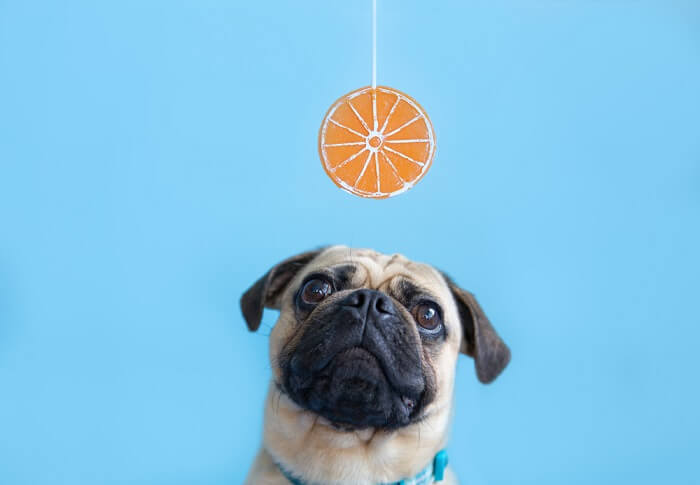
Not all dogs like oranges, even though they have a high sugar content. (I’ve only had one dog, out of many, who would eat oranges. I think she eats them because she sees me eating them.) The citrus-y tart taste can put dogs off eating them.
If you want to see if your dog likes oranges, start with one section of the orange (with the peel removed). If your dog likes the orange, you should proceed slowly. The citric acid in oranges can cause digestive upset, especially if your dog isn’t used to eating them. Half an orange or one small orange would be enough for the first week. Diarrhea can result if you give your dog too much.
How Often Can Dogs Eat Oranges?
If you find that your dog likes oranges and he becomes adjusted to eating them, you can offer him a few sections 2-3 days per week.
You should always keep an eye on your dog’s bowel movements after he eats orange sections to make sure his stomach isn’t upset from the citrus.
The Correct Diet Is Important
Dogs need to eat the correct diet for good health. This means that they require good quality protein and fat. Foods like oranges should only be given as an occasional treat. While there are many different ideas about good dog foods and different ways to feed dogs,
Here your dog needs the following in his diet:
- Good Sources of Protein- All dogs need good sources of animal protein in their diet. Meat, fish, poultry, and eggs are all good sources of animal protein.
- Good Sources of Fat- Fat provides essential fatty acids (EFA) and helps distribute the fat soluble vitamins A, D, E, and K so your dog’s body can absorb them.
- Named Ingredients- Look for named ingredients in your dog’s food and avoid generic ingredients. The more specific the ingredient is, the better. Otherwise, you don’t really know what you are feeding your dog.
- Low to Moderate Carbohydrates- Many dog foods are loaded with carbohydrates. This is true even with some good quality foods. Carbohydrates are not “bad” and they can be beneficial (dietary fiber can come from carbs, for example). But carbs should not be a substitute for protein.
- Avoid Artificial Preservatives, Colors, and Sweeteners- Artificial preservatives and colors/dyes have been linked to some health problems in humans and animals. You should try to avoid these ingredients in dog foods.
- AAFCO- AAFCO is the Association of American Feed Control Officials. AAFCO sets voluntary standards for pet food labeling. Look for foods that have these minimum standards.
- Fresh Water- All dogs need easy access to fresh water unless they are ill or have some other reason to be temporarily kept away from water. For example, if you are house training your puppy, it makes no sense to give him water overnight.
What Are Other Healthy Alternatives to Oranges In A Dog’s Diet?

Oranges are a healthy treat but there are many other fruits and vegetables that can provide some of the same benefits. You should consider these foods as treats.
Check with your veterinarian if your dog has any health issues and you are concerned about giving any of these foods.
- Apples
- Asparagus
- Bananas
- Bell pepper
- Broccoli
- Brussels sprouts
- Carrots
- Cauliflower
- Cucumber
- Green beans
- Mangos
- Parsnip
- Pears
- Pineapple
- Pumpkin
- Strawberries
- Summer squash
- Sweet potato
- Tomatoes
- Watermelon
- Zucchini
How Do You Give Your Dog Oranges?
If you decide to give your dog an orange, most people cut them up into sections. Oranges are easy to separate this way. Be sure to remove the orange peel and the pith (the spongy, stringy white material that covers the inside of the orange) since it is bitter and should not be given to dogs.
We also recommend removing the seeds from the orange or buying seedless oranges. (One way to remove the peel and pith:.asp)
You should not give your dog products like orange juice or marmalade made from oranges. These products contain high concentrations of sugar which are harmful to dogs. This is true even if the orange juice is natural.
Conclusion
It is safe to give your dog part of an orange. Not all dogs will eat them but some like them for their sweetness. If your dog likes oranges, start out slowly and only give him one or two sections to see if he can eat them without having any digestive problems.
Be sure to remove the peel, the pith, and the seeds. Consult with your veterinarian first if your dog is overweight, diabetic, or if he has any other health issues.






